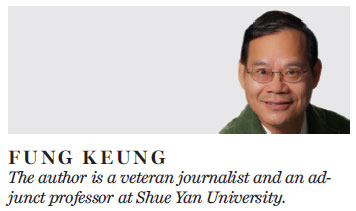Urgent need to increase supply of nurses in HK
Updated: 2016-06-27 07:32
By Fung Keung(HK Edition)
|
|||||||||
A professor's call to double Hong Kong's output of nurses in five years' time warrants the government's and society's support.
Professor Chair Sek-ying, director of the Chinese University of Hong Kong's Nethersole School of Nursing, recently urged the government to provide funding to add an extra 50 students a year to study for a nursing degree. In five years' time her school could produce 450 nursing graduates a year.
More qualified nurses will ease a manpower shortage in Hong Kong's public hospitals, reduce the number of medical blunders (which are sometimes fatal) and raise the quality of healthcare services in the city.
Currently, the ratio of nurses to patients at Hong Kong's public hospitals stands at one nurse to 12 patients, way below the international standard of one to six. (The ratio in the evening is even worse, at one nurse to 20 patients.)

Several medical blunders were reported in the press in recent months. In one high-profile case three nurses at Kowloon Hospital were struck off the nursing register for a month after they were found guilty of professional misconduct over the death of a 73-year-old cancer patient. This patient died of suffocation after a hole in his throat to enable him to breathe was taped over with gauze.
The nurses involved mistook the permanent tracheotomy for a temporary one, while one of the three nurses had been assigned the shift-in-charge position after being in the profession for only about a month.
There were 49 major medical blunders in Hong Kong's public hospitals between October 2013 and September 2014 (latest statistics available), according to official figures. A total of 26 patients died. Topping the blunder list was medical equipment left inside patients' bodies, causing major injury or death. There were 20 cases of instruments found inside patients. The Hospital Authority said earlier this month that it would organize training courses to minimize the number of common medical blunders.
The Nethersole School of Nursing produces about 200 nurses with bachelor's degrees every year. The University of Hong Kong (HKU) and the Hong Kong Polytechnic University (PolyU) also run degree programs for nursing students. If the government provides more funding for the Nethersole School of Nursing, it is well advised that similar funding should also be provided to HKU and PolyU.
A new private hospital is said to be opening in the city soon. Inevitably it will have to poach nurses from other private and government hospitals, further worsening the shortage of nurses in public hospitals.
The government's University Grants Committee has said funding for nursing student places at local universities would not be amended in the next three academic years. It appears that the government will have to come up with the money that is needed from other sources. There is no doubt that the government can afford an increase in nursing student places in local universities. But whether it has the will to proceed is another issue.
Bigwigs in society, particularly those in the health sector, should speak up and implore the government to increase the supply of nurses in the city in order to provide better medical services to its citizens and reduce the number of medical blunders. Where people's lives and health are concerned, the government should not look the other way.
(HK Edition 06/27/2016 page12)